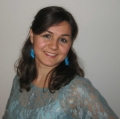|

Alsu Gilmetdinova
|
|

Andrés Ramírez
|
We would like to welcome the reader to the new issue of the
newsletter of the Bilingual Education Interest Section (BEIS). There are
many myths about bilingual education, and one is about assessment. Bi-
and multilingual children are often overrepresented in special
education, and many other important factors might be ignored in their
assessment. The purpose of this issue is to highlight several
peculiarities of multilingual language assessment from several
perspectives; from the perspectives of professor, from Dr. Elana
Shohamy, who has distinguished herself as a prominent scholar in
assessment of multilingual individuals; of teacher educator, from
Kathryn Henn-Reinke, who has a great experience in training pre- and
in-service bilingual teachers; and lastly, of classroom bilingual
teacher, from Carolina G. López, whose dedication to students and her
vocation inspires her to stay in this noble profession.
Each of these authors presents a unique perspective on
assessment, unveiling the fact that holistic assessment of multilingual
individuals should go beyond standard linguistic assessment and
integrate social, cultural, family, education, and personal information.
Such assessment requires that the schools identify, assess, and
intervene at early stages of language development and provide
opportunities for sustainable and continuous language education through
one's primary, middle, and high school education. Only such systematic,
targeted, and comprehensive curriculum and instruction led by
well-trained and passionate bilingual teachers and educators can create a
fruitful environment and opportunities for creating a multilingual
population around the world. The article in the Chinese language by Dr.
Hsiao-ping Wu strives to set an example for developing multilingual
education scholarship in more than the English language. We truly
believe that that is the way to move forward—promoting more than one
language.
Andrés
Ramírez is assistant professor of TESOL and Bilingual
Education at Florida Atlantic University, Boca Ratón, USA. His research
focuses on the academic achievement of emergent to advanced bilinguals
in K–16 contexts.
Alsu
Gilmetdinova is head of the Office of International Affairs at
the Kazan National Research Technical University (KNRTU-KAI) in the
city of Kazan, Russia. Her interests revolve around bilingual education,
language policy, and TESOL. |

